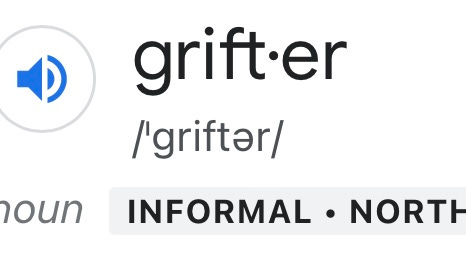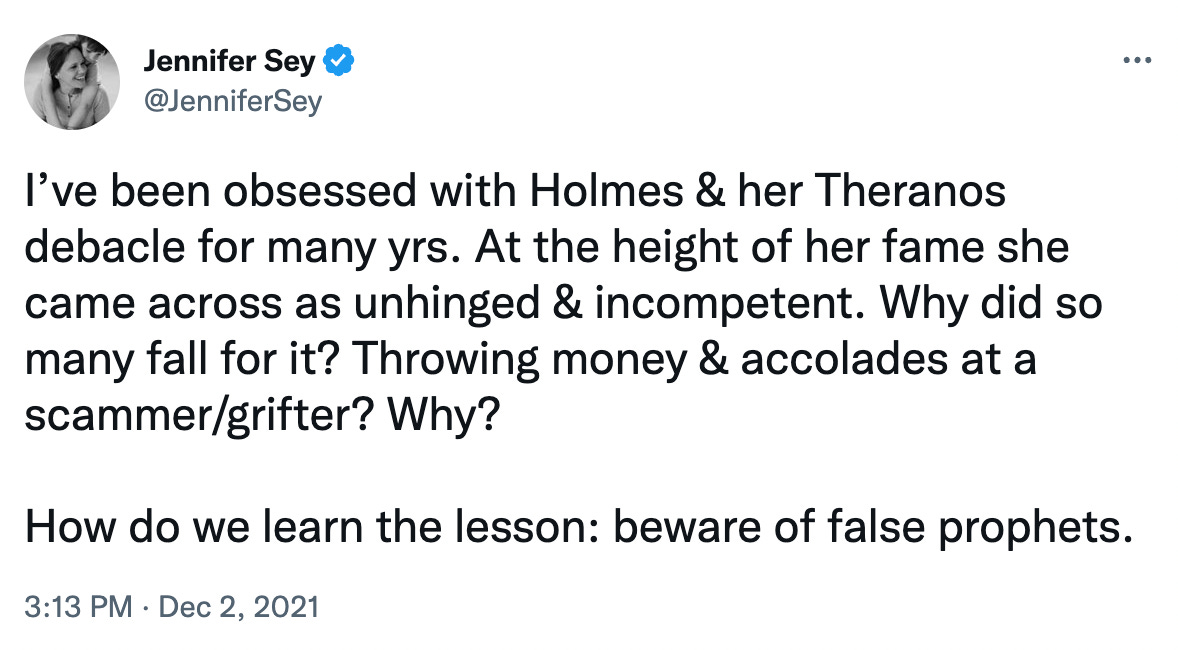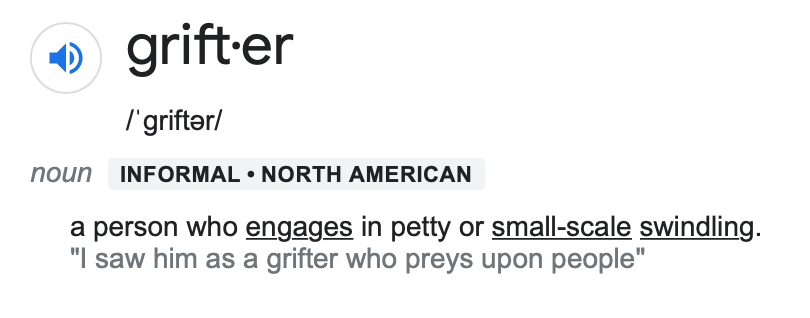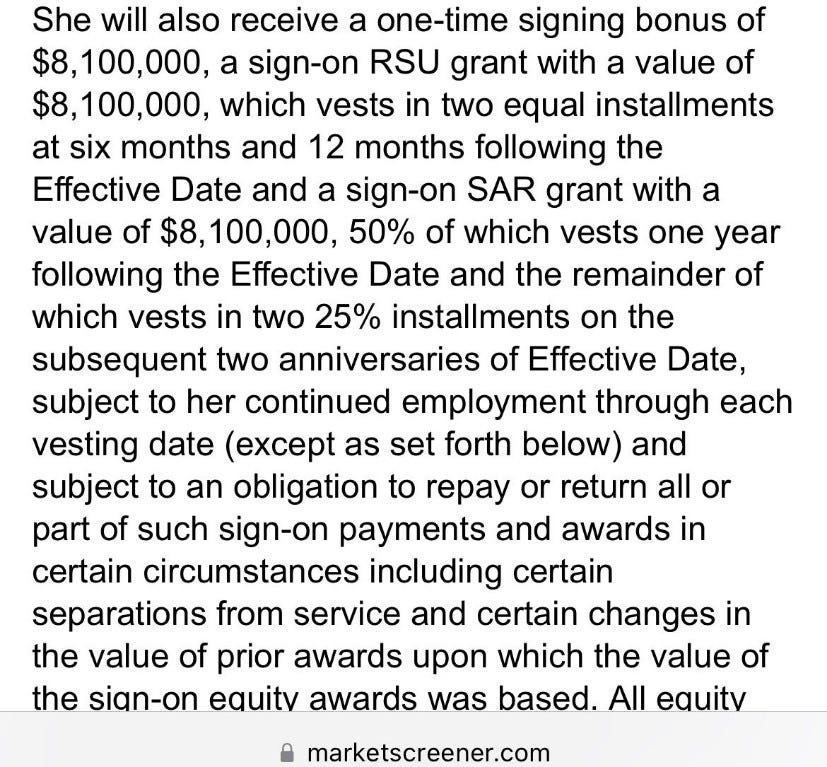Let's Retire The Word GRIFTER
Words matter and this one has been overused to the point of meaninglessness.
It’s time to retire use of the word GRIFTER.
I’ll admit, I’ve used it. Maybe too much. You won’t have trouble finding tweets in which I do. I’ve tried to reserve it for those I perceived as the griftiest of grifters. Elizabeth Holmes, comes to mind.
Or those who perpetrated pandemic aid fraud — people who stole money that was intended to feed hungry children.
But I think it’s time for me — and all of us, really — to stop using the word outright. Words matter and this one has been overused now to the point of uselessness. Flimsy application has rendered it meaningless.
Basically, anyone putting out thoughts into the ether that the mainstream cohort — the press, the people, the Party (Democrats) — disagrees with is accused of grift these days. The accused doesn’t even need to profit to earn the slur. All they have to do is say something disagreeable.
Journalist David Zweig wrote prolifically about the need to open public schools and end restrictions to children, throughout 2020 and 2021. Recently, journalist Walter Bragman all but accused Zweig of being a grifter. Bragman wrote on his Substack:
Zweig has made a name for himself as a COVID contrarian adopting positions that have brought him into alignment with powerful business interests . . .
He even assisted a libertarian think tank with ties to billionaire industrialist Charles Koch.
The implication here is that Zweig actually profited by aligning himself with “powerful business interests.” Bragman proves no such thing. Because it isn’t true.
If anything, writing about content that was contrary to the establishment narrative made it more challenging for Zweig to get published in the beginning. His first published piece making the case for opening schools appeared in Wired Magazine in May 2020. Before getting it published by Wired Magazine, he was rejected by nearly every publication he’d ever written for. He told me:
“I went and I started pitching a number of editors. I've written for The New York Times. I've written for The Atlantic. I've written for New York Magazine, The New Yorker and a whole long list of places. So I knew that I would just immediately start pitching these people. Whether it was an editor I knew or just cold pitching, every single one of them said: No.”
The idea that anyone saying anything unpopular is a grifter courting dark money, big audiences and social media likes is nonsensical and just plain false. In “grift” there must be a swindle — a theft rooted in a misrepresentation of one’s intentions.
What exactly is Zweig’s swindle? He’s not misrepresenting himself to fraudulently collect money from an unsuspecting target. Moreover, he’s not collecting money from powerful business interests. And getting rejected repeatedly by the prestige press that was once proud to print his work certainly doesn’t count as a grift.
Generally, in the past, the term “grifter” has been reserved for petty small time con artists. Think of the street corner Three-Card Monte hustler. In this rigged card game, the grifter spots his mark in the crowd, engages the crowd (who are all in on it) to encourage the mark to play (and hand over his money), but the mark never has a chance. There is no way to win, to find the one card in the shuffled stack of three. Some have equated this grift to a “polite mugging.” Which sounds about right.
In recent years, the term “grifter” has been applied to bigger scammers — people like Holmes, for instance. And one could argue it applies. Her marks were the investors. The issue in using “grifter” in these sorts of instances is that Holmes’ goal wasn’t theft — I don’t believe. She intended to make a finger prick blood draw machine that worked. When it didn’t, she didn’t stop. She was in too deep. So she kicked the can down the road, pretending it worked, until she got caught.
It’s been used against me too many times to count. Here are a few:
But what’s my con? I gave up a lucrative career to say what I think (rather than misrepresent myself), which, last time I checked, doesn’t pay a salary, let alone bonuses. And there are definitely no stock options.
Who are my marks? Who am I taking advantage of with my supposed lies, in order to profit? If my goal was to make as much money as possible by conning a gullible public, I’d have stuck with marketing jeans. And I’d be earning 10-15x what I’m earning now.
If I had continued as an executive and were a better negotiator, I could have made 100x what I’ll likely earn in the coming year. In fact, Michelle Gass, former CEO of Kohl’s, current Levi’s Brand President (my successor), will earn more than $20 million this coming year.
Or, if I continued successfully as Brand President and actually became the CEO, I might have earned 200x what I’ll likely earn this year. The current CEO, Chip Bergh, makes as much as $40 million a year.
To be clear, I am in no way suggesting that Gass or Bergh are grifters. They are being paid — exorbitantly, yes — to do a job. Whether they do those jobs less well than what the compensation should demand is not the point. There is no swindle.
Now, if I were to imply the g-word just one last time before I stop using it entirely, it seems Levi’s would be the mark in this scenario for handing over $20 million to Gass, someone who was not performing particularly well in her last job. In fact, the price of Kohl’s stock jumped 8.5% on the day her departure from Kohl’s was announced. Not a ringing endorsement.
At any rate . . . I’m not a grifter. Neither is Zweig. We aren’t conning or swindling anyone out of money we didn’t earn. In fact, we’re sacrificing our earning opportunities in order to say what we actually think. Which is, in fact, the exact opposite of grifting.











One of the techniques, quite effective as well, of Team Apocalypse is to use words as a negative label. The members of short attention span theater, which is most of the hoi polloi, will latch on. Racist! Trumper! Homophobic! These mental shortcuts are, unfortunately, effective. All of that, to say, great essay!
Great read Jennifer. The “catastrophization” of language (e.g., words are violence, etc.) must be met head on by opposition to the manipulative hyperbole. I don’t often disagree with you but this time I think we need to stand up to the “language grifters” (see what I did there 😜)